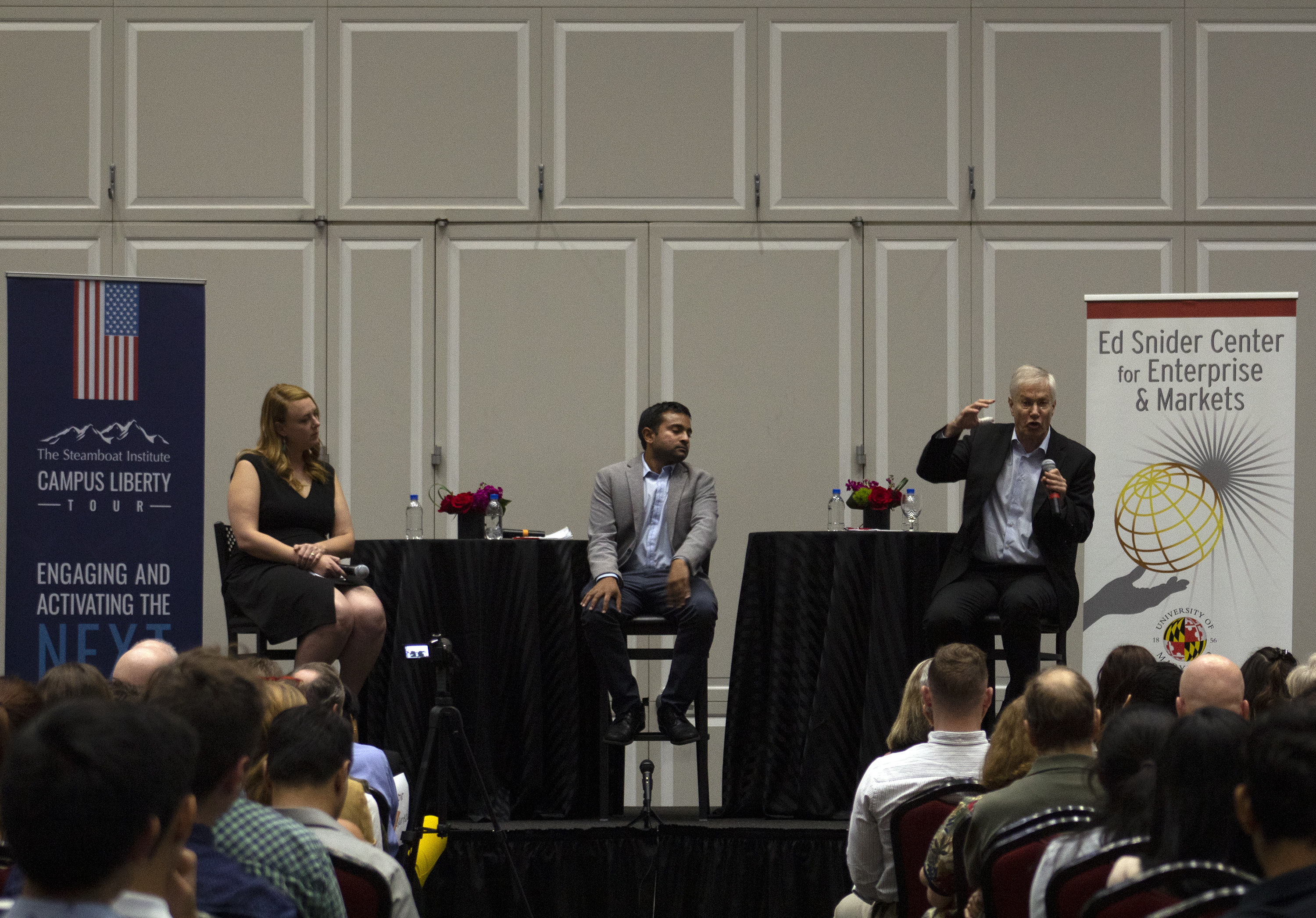Views expressed in opinion columns are the author’s own.
Upon hearing that the University of Maryland’s business school would be hosting a debate on capitalism vs. socialism, I wasn’t terribly interested. Gather a bunch of business students in a room, pontificate about markets and bash the vague idea of socialism for a while — I figured I got the picture and didn’t need to see it in person. The event was a partnership with The Steamboat Institute, a conservative nonprofit. The moderator: Jillian Kay Melchior, a Wall Street Journal editorial page writer. My suspicions were confirmed.
But scrolling through the event’s information, I found that the pro-socialism speaker would be Bhaskar Sunkara, the founder and editor of the magazine Jacobin, which is among the most influential publications in the rising socialist movement in American politics.
I would normally have tried to avoid philosophical debates hosted by the business school. But against all my natural instincts, I decided I should go.
The debate was held Tuesday at the Samuel Riggs IV Alumni Center. Before the event started, I heard a couple people nearby saying that the pro-capitalism debater had been featured in a great interview on Ben Shapiro’s Sunday Special. I wasn’t sure if I’d ever actually heard someone speaking fondly of Shapiro in public.
I quietly hoped that there wouldn’t be any corny audience participation moments. Within five minutes, Melchior asked the audience to raise their hands to indicate whether they supported capitalism or socialism. The Ben Shapiro fans shot their hands up for capitalism. The night was off to quite a start.
The debaters were framed on either side of the stage by signs for the Ed Snider Center for Enterprise and Markets and The Steamboat Institute Campus Liberty Tour. Through the perspective of a socialist, this would be like watching the Yankees play at Fenway Park. Sitting opposite Sunkara as the pro-capitalist debater was Yaron Brook, whose political philosophy might best be described as “Ayn Rand Superfan.” Naturally, he is the chairman of the board of the Ayn Rand Institute.
Melchior, for her part, did a decent job. Though her opening remarks included an eye roll-inducing jab at socialists for not being able to take a joke and a line about how the goal is “not to make ideas safe for students,” her role as moderator was surprisingly even-handed and understated. Not to take away from Melchior, but perhaps the reason she remained mostly impartial was that Brook’s ideas are so off the wall that even a committed conservative would cringe at some of what he said.
The debate itself was a frustrating spectacle. Sunkara and Brook clearly disagreed on what socialism means, but that was never addressed. Brook was a much better orator with far loonier politics (all government involvement in the economy is bad, altruism is amoral, etc.), leaving me wishing that Sunkara came armed with more clever slogans to whip out.
Sunkara opened with a reasonable explanation of his politics. As he explained, there should be a guarantee of public goods like housing and health care. The hierarchy of workplaces are a “tyranny” that strips workers of their rights. He introduced the idea of workplace democracy, that workers could organize their workplaces collectively in an effective way and establish a more egalitarian system of production. Cautiously trying not to appear too radical, he even appealed to his far more right-of-center audience, saying that he’s no revolutionary: All he wants is to take the social democracy of countries like Denmark and Sweden a step further. He carefully avoided using the phrase “means of production.”
Brook responded in a way that was initially promising. “It’s always good in a debate to define your terms,” he said. That’s true. Sunkara hadn’t really explained what socialism as a concept means — some form of social ownership of productive facilities — and for years right-wing American pundits and politicians have been yelling about how socialism means the government will expropriate your toothbrush.
And with that fleeting moment of clarity, Brook proceeded to give a long speech about how “capitalism is a system of freedom” and “socialism is immoral,” never once accurately defining any of those terms. Ignoring Sunkara’s actual beliefs, Brook invoked the misery of the Soviet Union and China in defense of capitalism.
Throughout the event, Brook highlighted his belief that any government intervention in the economy is wrong. Forget about any and all labor laws, environmental regulations, you name it. Responding to a question from a student about the environment, Brook gleefully dipped into climate denial, saying young people are “always depressed about the environment. ‘The world is going to end in 12 years’ or something. Life has never been better.”
Toward the end of the event, it was abundantly clear that the debate hadn’t gotten very far. An audience member posed a question about Venezuela. Sunkara explained that Venezuela really isn’t a socialist country by any measure. Without pause, Brook said that Venezuela is a failure of socialism. And with that, I left the auditorium vowing never to return to a debate hosted by this university’s business school.
Zachary Jablow, opinion editor, is a junior economics and government and politics major. He can be reached at zachjablow@gmail.com.



